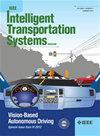DRL Router: Distributional Reinforcement Learning-Based Router for Reliable Shortest Path Problems
IF 5
3区 工程技术
Q1 ENGINEERING, ELECTRICAL & ELECTRONIC
IEEE Intelligent Transportation Systems Magazine
Pub Date : 2023-09-01
DOI:10.1109/MITS.2023.3265309
引用次数: 0
Abstract
This article studies reliable shortest path (RSP) problems in stochastic transportation networks. The term reliability in the RSP literature has many definitions, e.g., 1) maximal stochastic on-time arrival probability, 2) minimal travel time with a high-confidence constraint, 3) minimal mean and standard deviation combination, and 4) minimal expected disutility. To the best of our knowledge, almost all state-of-the-art RSP solutions are designed to target one specific RSP objective, and it is very difficult, if not impossible, to adapt them to other RSP objectives. To bridge the gap, this article develops a distributional reinforcement learning (DRL)-based algorithm, namely, DRL-Router, which serves as a universal solution to the four aforementioned RSP problems. DRL-Router employs the DRL method to approximate the full travel time distribution of a given routing policy and then makes improvements with respect to the user-defined RSP objective through a generalized policy iteration scheme. DRL-Router is 1) universal, i.e., it is applicable to a variety of RSP objectives; 2) model free, i.e., it does not rely on well calibrated travel time distribution models; 3) it is adaptive with navigation objective changes; and 4) fast, i.e., it performs real-time decision making. Extensive experimental results and comparisons with baseline algorithms in various transportation networks justify both the accuracy and efficiency of DRL-Router.DRL路由器:基于分布式强化学习的可靠最短路径路由器
本文研究随机运输网络中的可靠最短路径问题。RSP文献中的术语可靠性有许多定义,例如,1)最大随机准时到达概率,2)具有高置信度约束的最小旅行时间,3)最小平均值和标准差组合,以及4)最小预期无效性。据我们所知,几乎所有最先进的RSP解决方案都是针对一个特定的RSP目标而设计的,即使不是不可能,也很难将其适应其他RSP目标。为了弥补这一差距,本文开发了一种基于分布式强化学习(DRL)的算法,即DRL路由器,它是上述四个RSP问题的通用解决方案。DRL路由器采用DRL方法来近似给定路由策略的全行程时间分布,然后通过广义策略迭代方案对用户定义的RSP目标进行改进。DRL路由器是1)通用的,即适用于各种RSP目标;2) 无模型,即不依赖于校准良好的旅行时间分布模型;3) 它适应导航目标的变化;以及4)快速,即执行实时决策。在各种交通网络中,大量的实验结果以及与基线算法的比较证明了DRL路由器的准确性和效率。
本文章由计算机程序翻译,如有差异,请以英文原文为准。
求助全文
约1分钟内获得全文
求助全文
来源期刊

IEEE Intelligent Transportation Systems Magazine
ENGINEERING, ELECTRICAL & ELECTRONIC-TRANSPORTATION SCIENCE & TECHNOLOGY
CiteScore
8.00
自引率
8.30%
发文量
147
期刊介绍:
The IEEE Intelligent Transportation Systems Magazine (ITSM) publishes peer-reviewed articles that provide innovative research ideas and application results, report significant application case studies, and raise awareness of pressing research and application challenges in all areas of intelligent transportation systems. In contrast to the highly academic publication of the IEEE Transactions on Intelligent Transportation Systems, the ITS Magazine focuses on providing needed information to all members of IEEE ITS society, serving as a dissemination vehicle for ITS Society members and the others to learn the state of the art development and progress on ITS research and applications. High quality tutorials, surveys, successful implementations, technology reviews, lessons learned, policy and societal impacts, and ITS educational issues are published as well. The ITS Magazine also serves as an ideal media communication vehicle between the governing body of ITS society and its membership and promotes ITS community development and growth.
 求助内容:
求助内容: 应助结果提醒方式:
应助结果提醒方式:


